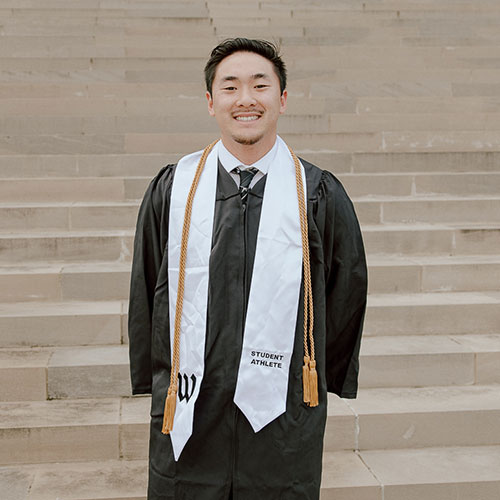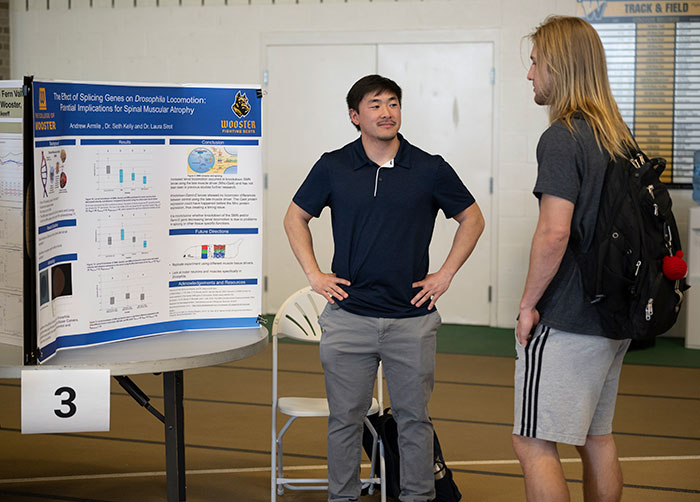
Biology major studies spinal muscular atrophy in search for a cure

On an educational path to become a physician, Andrew Armile ’24 wanted to learn more about spinal muscular atrophy, a genetic disorder that causes muscle weakness and atrophy, or shrinking in the body’s skeletal muscles. The mother of a good friend was diagnosed with a related muscular dystrophy disease, and the biology major took the opportunity to expand his understanding of it through scholarly research.
“Looking back on my experiences at Wooster, I have truly grown into a well-rounded individual. From playing on the football team to achieving great success on my I.S., Wooster has prepared me to accomplish my goals. The balance of athletics, academics, and great people is what truly sets the College apart from other schools.”
—Andrew Armile ’24
With the guidance of his Independent Study mentors Seth Kelly, associate professor of biology, and Laura Sirot, professor of biology, Armile looked at the effect of genes in specific motor neurons in common fruit flies to provide findings that might aid in the discovery of a cure for Spinal Muscular Atrophy.
Q: What excites you about your I.S.?
Armile: I was excited to take full ownership of my I.S. project related to the real world of disease and medicine. I studied the disease pathology of spinal muscular atrophy and provided results that could potentially aid in finding a cure for the disease. I also learned new and unique lab techniques involving Drosophila melanogaster, known as the common fruit fly. The project allowed me to create a scientific research proposal, experiment, and paper of my own to showcase.
Q: How did Wooster prepare you for designing your project?
Armile: I had prior knowledge of some of the material from previous classes which made the research process a lot smoother. In my biology-based courses, I also read a lot of scientific articles related to class topics, which helped in synthesizing the information. The STEM courses built on each other and helped me create connections with my I.S. project. Playing football for the college also helped me manage my time during the I.S. process. Being a part of Wooster Christian Fellowship, a Christian group on campus, also aided in my success during the I.S. process.

Armile presented his research to the College Community at the Senior Research Symposium.
Q: In what ways has your relationship with your I.S. mentor supported you throughout this process?
Armile: My advisors were fantastic. Professor Kelly taught me lab techniques and helped me learn about the topic. He was understanding after I broke my collarbone and was great to talk with outside of the classroom. I learned data analysis techniques from Professor Sirot, and her structure, support, and kindness helped get me to the finish line of the I.S. process.
Q: What has I.S. taught you?
Armile: I learned research skills, lab skills, time management, and communication skills. I also gained confidence that I can accomplish anything I set my mind to.
With a goal of becoming a physician, Armile is taking some courses at Youngstown State University and studying for the Medical College Admission Test (MCAT) to apply to medical schools.
Posted in Independent Study on June 20, 2024.
Related Posts
Related Areas of Study
Pre-Health
Guidance on course selection, research opportunities and other planning for medical and dental school
Pre-Professional AdvisingBiology
Explore molecular and cellular biology, ecology and more with top faculty and access to extensive lab facilities.
Major Minor

